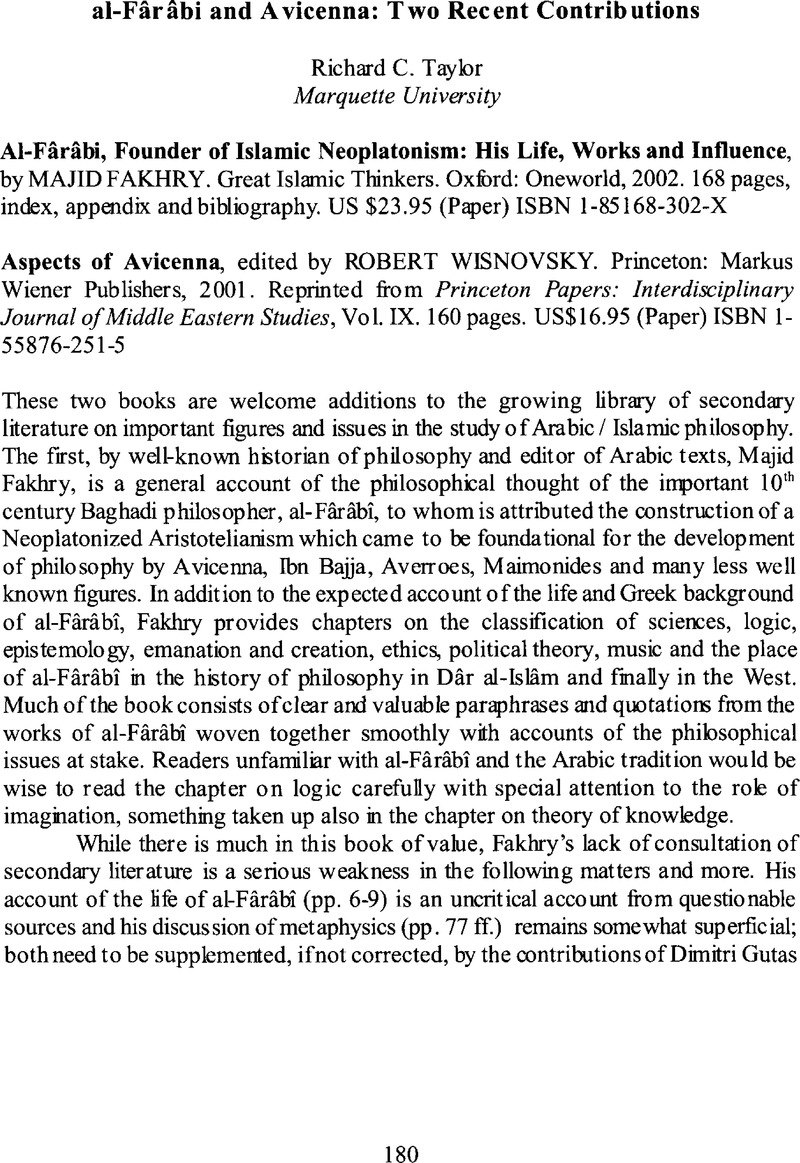Article contents
al-Fârâbi and Avicenna: Two Recent Contributions - Al-Fârâbi, Founder of Islamic Neoplatonism: His Life, Works and Influence, by Majid Fakhry. Great Islamic Thinkers. Oxford: Oneworld, 2002. 168 pages, index, appendix and bibliography. US $23.95 (Paper) ISBN 1-85168-302-X - Aspects of Avicenna, edited by Robert Wisnovsky. Princeton: Markus Wiener Publishers, 2001. Reprinted from Princeton Papers: Interdisciplinary Journal of Middle Eastern Studies, Vol. IX. 160 pages. US$16.95 (Paper) ISBN 1-55876-251-5
Published online by Cambridge University Press: 09 March 2016
Abstract

- Type
- Review Essays
- Information
- Copyright
- Copyright © Middle East Studies Association of North America 2005
References
1 See “al-Fârâbî”, in Encyclopaedia Iranica, Yarshater, Ehsan, ed. (New York, 1999), pp. 208–29.Google Scholar The entire article with contributions by Gutas, Black, Druart, Sawa and Mahdi should be consulted.
2 See Geoffroy, Marc, “La tradition arabe du Peri nou d’Alexandre d’Aphrodise et les origines de la théorie ferabienne des quatre degrés de l’intellect,” in Aristotele e Alessandro di Afrodisia nella Tradizione Araba, D’Ancona, Cristina and Serra, Giuseppe, eds. (Subsidia Mediaevalia Patavina 3) (Padova, 2002), pp. 191–231.Google Scholar
3 See Jolivet, Jean, L’Intellect selon Kindi. (Leiden, 1971).Google Scholar
4 Gutas, Dimitri, Avicenna and the Aristotelian Tradition: Introduction to Reading Avicenna’s Philosophical Works (Leiden, 1988). Seep. 240 ff.Google Scholar
5 See Taylor, Richard C., “Averroes’ Philosophical Analysis of Religious Propositions,” in Miscellanea MediaevaHa 26: What is Philosophy in the Middle Ages? Proceedings of the 10th International Congress of Medieval Philosophy of the S.I.E.P.M., 25–30 August 1997 in Erfurt, Aertsen, Jan and Speer, Andreas, eds. (Cologne, 1998), pp. 888–94.Google Scholar
6 Also see Black, Deborah L., Logic and Aristotle’s Rhetoric and Poetics in Medieval Arabic Philosophy. (Leiden, 1990).Google Scholar
- 2
- Cited by


